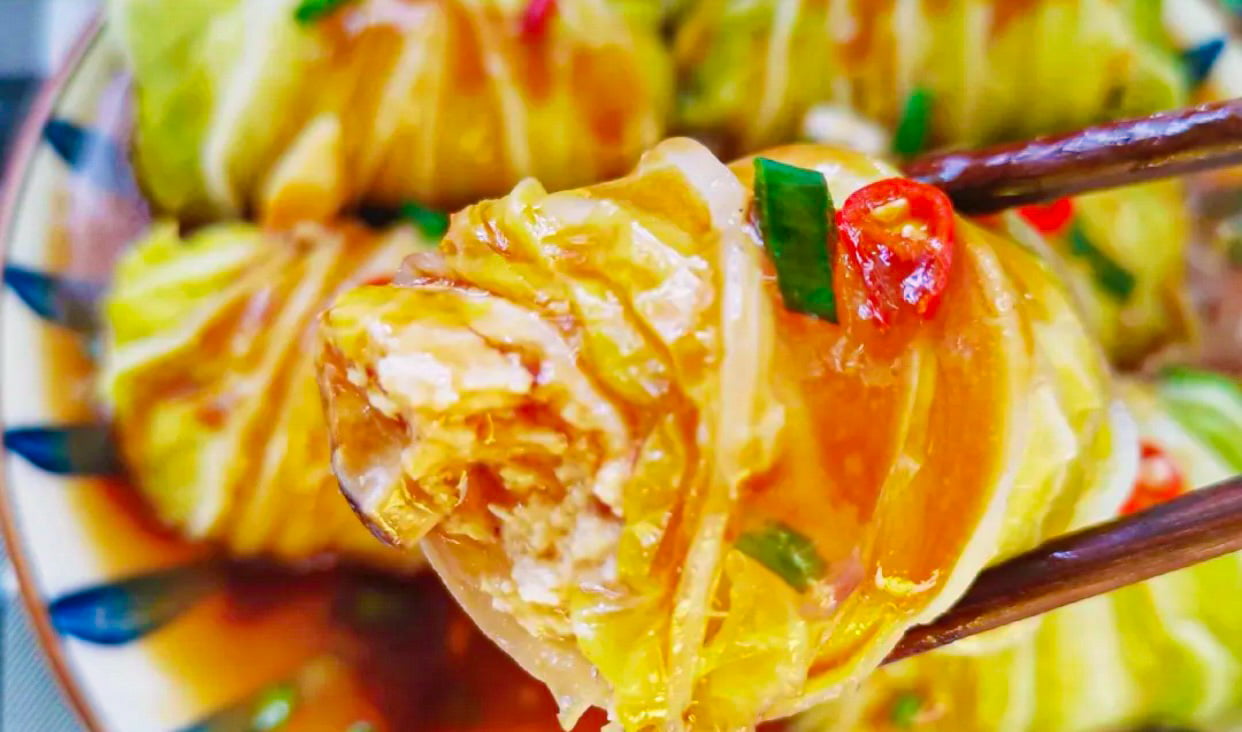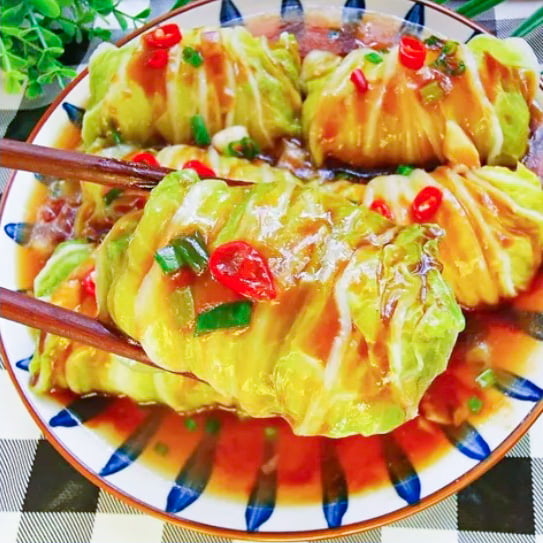Craving a delicious and comforting dish that will impress your taste buds? Look no further than chicken stuffed cabbage rolls! This delightful recipe combines tender cabbage leaves, flavorful ground chicken, and a medley of aromatic herbs and spices, all wrapped up in a cozy bundle. Indulge in every mouthful and savor the delightful symphony of textures and flavors, igniting an insatiable desire for another bite.
Below, we will guide you step by step on how to make chicken cabbage rolls.
Chicken Cabbage Rolls Recipe
Prep Time
30 minutes
Cook Time
25 minutes
Rest Time
0 minutes
Total Time
55 minutes
Ingredients
Directions
1. Bring a large pot of water to a boil. Gently detach the cabbage leaves and immerse them in boiling water for approximately 2-3 minutes until they turn flexible. Retrieve the leaves from the water and let them cool aside.
2. In a mixing bowl, combine the ground chicken, grated carrot, diced red bell pepper, chopped onion, minced garlic, half of the coconut amino, hoisin sauce, oyster sauce, sesame oil, grated ginger, salt, and pepper. Mix everything together thoroughly until well combined.
3. Take a cabbage leaf and place a generous amount of the chicken mixture near the base of the leaf. Take the filling and tightly roll it up in the cabbage leaves, folding the sides inward, resembling a burrito. Repeat this procedure with the remaining cabbage leaves and filling.
4. On medium heat, heat a large pan with a lid. Arrange the cabbage rolls with the seam-side facing downwards in the pan, then pour water into the pan to fill it. Add enough water to submerge the cabbage rolls, and add the remaining two tablespoons of coconut amino.
5. Cover the pan with the lid and let the rolls simmer for approximately 20-25 minutes, or until the cabbage leaves become tender and the filling is thoroughly cooked.
6. After cooking, delicately take out the rolls from the pan and transfer them to a serving dish. Drizzle any remaining pan juices over the rolls. Garnish with green onion or pepper if desired.
Tips & Notes
Choose the right cabbage: Look for a large head of cabbage with firm and vibrant leaves. When rolling the filling, the leaves should be flexible and effortless to handle.
Blanch the cabbage leaf: To make them easier to roll, blanch the cabbage leaves in boiling water for a few minutes until they become pliable. This process will additionally aid in tenderizing the leaves and eliminating any bitter taste.
Don't overstuff the cabbage leaves: It's important not to overstuff them, as it may cause them to tear or not cook evenly. Employ a moderate quantity of filling and tightly roll the leaves to guarantee their cohesiveness throughout the cooking process.
Nutritional Facts
Nutrition Facts
Servings: 6
Calories
422
% Daily Value*
Total Fat 10.8g
14%
Saturated Fat 1.7g
9%
Cholesterol 188mg
63%
Sodium 522mg
23%
Total Carbohydrate 10.4g"
4%
Dietary Fiber 2.3g
8%
Total Sugars 4.4g
Protein 67.3g
Vitamin D 0mcg
0%
Calcium 158mg
12%
Iron 2mg
13%
Potassium 451mg
10%
*The % Daily Value (DV) tells you how much a nutrient in a food serving contributes to a daily diet. 2,000 calorie a day is used for general nutrition advice.

What You Will Need To Make Chicken And Mushroom Cabbage Rolls
Ground Chicken Breast
Ground chicken breast is an excellent choice for this recipe of Asian-inspired stuffed cabbage rolls. It offers a lighter and leaner alternative to ground pork, ground beef, or ground turkey while still providing a flavorful and moist filling.
Mushroom
Feel free to select any mushrooms that you prefer. I utilized fresh shiitake mushrooms in this particular recipe, which offer a profound, indulgent, buttery, and savory taste. If you opt for dried shiitake mushrooms, they provide a concentrated, smoky richness. You can even combine both varieties for an enhanced flavor profile if possible.
Cabbage
Green and Napa cabbage are excellent choices for making Asian-inspired chicken cabbage rolls. Here's more information about each type of cabbage and how they can be used in the recipe:
Green cabbage is the most common cabbage used in traditional stuffed cabbage roll recipes. It has a round shape and dense, tightly packed leaves. Green cabbage has a gentle, subtly sweet taste and crunchy texture. When cooked, the leaves become tender and add a satisfying bite to the rolls. Its sturdy leaves make it easy to roll and hold the filling securely.
Napa cabbage, also recognized as Chinese cabbage or celery cabbage, features an elongated form and lighter, more delicate leaves than green cabbage. It has a milder, sweeter flavor with a slight hint of peppery notes. Napa cabbage has a softer texture and more delicate leaves, which can make it slightly more challenging to roll tightly. However, its delicate flavor and tender leaves add a unique twist to the chicken cabbage rolls.
Carrot
The grated carrot adds natural sweetness, vibrant color, and a pleasant crunch to the filling. Carrots are abundant in beta-carotene, a precursor to vitamin A, known for its ability to enhance vision health and bolster immune function. They also contain dietary fiber and antioxidants that contribute to overall health.
Red Bell Pepper
Diced red bell pepper brings a pop of bright color and a mild, slightly sweet flavor to the filling. It serves as an outstanding source of vitamin C, essential for fortifying the immune system and promoting collagen production. Red bell peppers also provide antioxidants and dietary fiber.
Onion
Finely chopped onion adds depth and savory notes to the filling. Onions are part of the allium family, renowned for their aromatic and flavorful qualities. They offer a harmonious blend of sweetness and tang, elevating the overall taste of the dish. Onions contain antioxidants, vitamins, and minerals that offer various health benefits.
Garlic
Minced garlic brings a distinctive and aromatic flavor to the filling. It offers a pungent yet slightly sweet taste. Garlic is recognized for its potential health advantages, such as supporting the immune system, promoting heart health, and possessing anti-inflammatory properties.
Coconut Amino
Using coconut aminos in this recipe can be a wonderful alternative to traditional soy sauce. Coconut aminos, extracted from coconut blossom sap, have become increasingly popular as a gluten-free, soy-free, and reduced-sodium substitute for soy sauce.
Hoisin Sauce
Hoisin sauce is a dense, dark sauce crafted from soybeans, garlic, sugar, and various spices. It offers a sweet, savory, and tangy flavor profile. Hoisin sauce adds richness and depth to the filling, balancing the other flavors and creating a harmonious blend.
Oyster Sauce
Oyster sauce, a lustrous and viscous condiment, is prepared from oysters, soy sauce, and a medley of seasonings. It imparts a rich, savory, and umami essence to the filling. Oyster sauce enhances the overall taste profile and adds complexity to the dish. If oyster sauce is not available, you can use oyster sauce alternatives like hoisin sauce.
Sesame Oil
Sesame oil, derived from sesame seeds, is an aromatic and savory oil. Its distinctive nutty flavor enhances the depth and richness of the dish. Used in small amounts, sesame oil provides a delightful aroma and enhances the overall Asian-inspired flavors.
Ginger
Grated fresh ginger adds a warm, spicy, and slightly citrusy flavor to the filling. Ginger brings a zingy freshness and depth of taste to the dish. It is known for its potential digestive and anti-inflammatory properties.
How To Elevate Stuffed Cabbage Rolls Dish
Experiment With The Filling
While the recipe already includes a flavorful combination of ingredients, feel free to add additional elements to enhance the taste. Consider adding finely chopped water chestnuts for crunch, shiitake mushrooms for an earthy flavor, or even a splash of fish sauce for added umami depth.
Use Homemade Sauces
Instead of store-bought sauces like soy sauce or hoisin sauce, consider making your own from scratch. Crafting homemade sauces can enhance the flavors of your dish and allow you to tailor the taste according to your preferences. Experiment with different combinations of soy sauce, rice vinegar, honey or maple syrup, garlic, ginger, and chili paste to create a personalized sauce that perfectly complements the rolls.
If you don't want to go with the Asian route, use tangy tomato paste sauce instead. Cooking stuffed cabbage rolls in tomato paste sauce is a popular and delicious variation that adds a rich and tangy element to the dish. The crushed tomatoes infuse the rolls with their robust flavors and create a succulent, saucy finish. Serve the cabbage rolls with a ladle of tomato sauce, and you'll have a comforting and satisfying meal that bursts with savory goodness.
Try Different Cooking Techniques
While the recipe suggests baking or stovetop cooking, consider experimenting with other cooking techniques. For example, you can try grilling the stuffed cabbage rolls for a smoky flavor or steaming them for a lighter and healthier approach. These alternative methods can add unique characteristics to the dish.

Frequently Asked Questions (FAQ)
Can You Bake Cabbage Rolls
Yes, you can definitely bake cabbage rolls! Opting for the oven-baking technique is a well-liked and practical approach that produces delectable outcomes. Choose a spacious baking dish, such as a casserole dish or baking pan, that provides ample room for the cabbage rolls without overcrowding. Ensure that the chosen dish possesses sufficient depth to contain any sauce or liquid you intend to include.
Can I Use A Different Type Of Meat In The Filling?
Certainly! While traditional recipes often use ground beef or pork, you can experiment with different meats or plant-based alternatives. Ground chicken, turkey, lamb, or even a mixture of meats can work well. Veggie options like mushrooms, lentils, or tofu can be used as substitutes too.
Can I Make Stuffed Cabbage Rolls Vegetarian Or Vegan?
Stuffed cabbage rolls can be easily adapted to a vegetarian or vegan diet. Substitute the meat with plant-based protein alternatives such as tofu, tempeh, or cooked lentils. You can also load the filling with various vegetables, grains, and spices for added flavor.
How Do I Prevent The Cabbage Leaves From Tearing When Rolling?
To prevent cabbage leaves from tearing, blanch them briefly in boiling water to soften them before rolling. Eliminate the resilient central rib from each leaf, as it may impede the rolling process. If a leaf does tear, you can use an extra cabbage leaf to patch it up or simply roll the filling tightly to hold everything together.
Can I Freeze Stuffed Cabbage Rolls?
Certainly, stuffed cabbage rolls can be frozen! Freezing them offers a convenient option to prepare them ahead of time or preserve leftovers for future enjoyment. These rolls can be stored in the freezer for a period of up to 3 months. Beyond that, their quality may begin to deteriorate.
When you're ready to relish the frozen cabbage rolls, remove them from the freezer and allow them to thaw in the refrigerator overnight. Once thawed, you can reheat them in the oven, microwave, or stovetop. It's important to ensure they reach an internal temperature of 165°F (74°C) to guarantee thorough heating.
